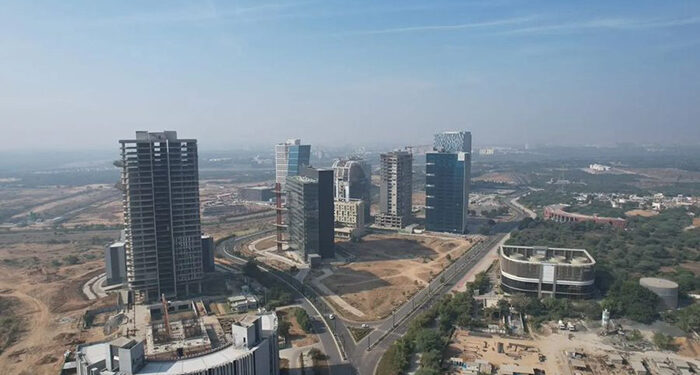CHENNAI, MARCH 14

The Government of India and the Asian Development Bank (ADB) on Thursday signed a $23 million loan agreement to enhance access to quality fintech education, research, and innovation at the Gujarat International Finance Tec-City (GIFT-City). They have also signed another loan agreement amounting to $181 million, in a collaborative effort to enhance the quality of life and mobility in the peri-urban areas of Ahmedabad city in Gujarat.
The signatories to the loan agreement for Promoting Research and Innovation through Development of Fintech Institute at GIFT-City Project were Juhi Mukherjee, Joint Secretary, Department of Economic Affairs, Ministry of Finance, for the Government of India, and Rajesh Vasudevan, Officer-in Charge of ADB’s India Resident Mission, for ADB.
- The project will establish an International Fintech Institute (IFI) to strengthen fintech education, boost start-up success rates, and drive fintech research and innovation in GIFT City
- Government of India, ADB join forces to enhance livability and mobility in Ahmedabad
- The Ahmedabad Peri-urban Livability Improvement Project is poised to benefit urban poor, women, and migrant workers through various interventions aimed at improving urban services and governance
- The project includes the construction of 166 km of water distribution network, 126 km of climate-resilient storm water drainage, 300 km of sewerage systems, and four sewage treatment plants
After signing the loan agreement, Mukherjee said that this project will establish an International Fintech Institute (IFI) to strengthen fintech education, boost start-up success rates, and drive fintech research and innovation.
“The project’s emphasis on market-driven fintech skills programmes, creating enabling environment for private sector investment and enhancing collaboration between industry, skills development institutes and development partners will promote holistic growth of fintech ecosystem in India,” said Vasudevan.
The IFI, set to be established in partnership with globally reputed institutes and universities, will offer industry-aligned fintech training programmes that meet international standards. The institute will strengthen innovation and entrepreneurship by supporting startups, especially women-led, through incubation and acceleration services. It will also collaborate with industry and venture capital funds to support the growth of fintech startups.
These interventions will contribute to enhanced employment opportunities, workforce competitiveness, and productivity in new and green technologies.
The ADB programme will support research on innovative solutions and technologies in climate fintech, regulatory technology, social inclusion, and gender equality in finance. The project will help establish a state fintech readiness index and develop new solutions to emerging technologies.
Government of India, ADB join forces to enhance livability and mobility in Ahmedabad
The Government of India and the Asian Development Bank (ADB) have signed a loan agreement amounting to USD 181 million, in a collaborative effort to enhance the quality of life and mobility in the peri-urban areas of Ahmedabad city in Gujarat.
According to a press release by the Ministry of Finance, the agreement for the Ahmedabad Peri-urban Livability Improvement Project was formalized by Juhi Mukherjee, Joint Secretary, Department of Economic Affairs, Ministry of Finance for the Government of India, and Rajesh Vasudevan, Officer-in-Charge of ADB’s India Resident Mission, representing the ADB.
Mukherjee highlighted the project’s objective to transform the peri-urban areas of Ahmedabad into livable, environmentally sustainable, and efficient zones with robust physical and social infrastructure.
She said, “The project aims to make peri-urban areas of Ahmedabad livable, environmentally sustainable, and efficient with robust physical and social infrastructure, a vibrant economy, and a distinct identity as a preferred investment destination.”
She emphasized the importance of creating vibrant economies and distinct identities for these areas, positioning them as preferred investment destinations.
Echoing this sentiment, Vasudevan emphasized the significance of managing Ahmedabad’s urban sprawl effectively, especially in the peri-urban regions, amidst its ongoing expansion as an economic growth center.
He outlined the project’s interventions aimed at expanding quality urban services and enhancing transport connectivity to address the needs of the large migrant population settled in these peripheral areas.
“Ahmedabad’s continued expansion presents an opportunity as an economic growth center while the attendant challenge is to better manage the city’s urban sprawl especially in the peri-urban areas,” said Vasudevan.
He added, “The project’s interventions aim to address this challenge with the expansionof quality urban services and transport connectivity for the large migrant population settled in the city’s peripheral areas.”
The Ahmedabad Peri-urban Livability Improvement Project is poised to benefit urban poor, women, and migrant workers through various interventions aimed at improving urban services and governance.
The project includes the construction of 166 km of water distribution network, 126 km of climate-resilient storm water drainage, 300 km of sewerage systems, and four sewage treatment plants.
Additionally, it will support the enhancement of 10 junctions along the existing Sardar Patel Ring Road to improve connectivity between peri-urban areas and Ahmedabad city.










